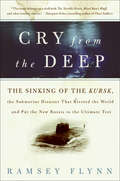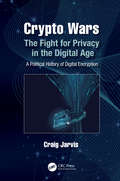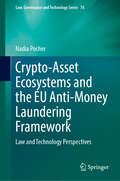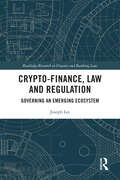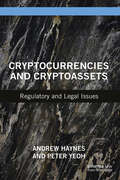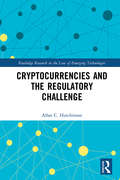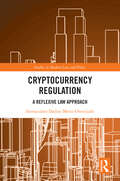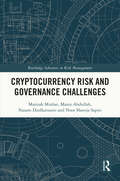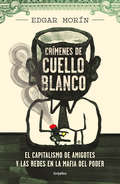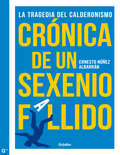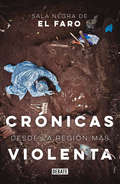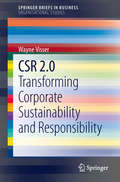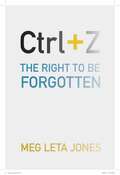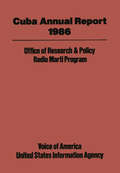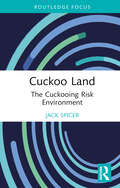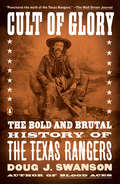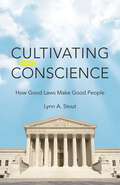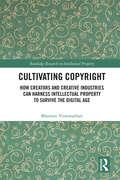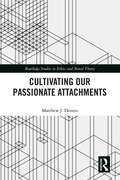- Table View
- List View
Crusaders in the Courts: How a Dedicated Band of Lawyers Fought for the Civil Rights Revolution
by Jack GreenbergStory of the NAACP Legal Defense Fund
Cry Rape: The True Story of One Woman's Harrowing Quest for Justice
by Bill LuedersCry Rape dramatically exposes the criminal justice system’s capacity for error as it recounts one woman’s courageous battle in the face of adversity. In September 1997, a visually impaired woman named Patty was raped by an intruder in her home in Madison, Wisconsin. The rookie detective assigned to her case came to doubt Patty’s account and focused the investigation on her. Under pressure, he got her to recant, then had her charged with falsely reporting a crime. The charges were eventually dropped, but Patty continued to demand justice, filing complaints and a federal lawsuit against the police. All were rebuffed. But later, as the result of her perseverance, a startling discovery was made. Even then, Patty’s ordeal was far from over. Other books have dealt with how police and prosecutors bend and break the law in their zeal to prevail. This one focuses instead on how the gravest injustice can be committed with the best of intentions, and how one woman’s bravery and persistence finally triumphed.
Cry from the Deep: The Sinking of the Kursk
by Ramsey FlynnA “superb account” of the disastrous loss of a Russian submarine off the nation’s northern coast and its repercussions (Publishers Weekly).On August 12, 2000, during one of the most important military demonstrations in post-Soviet history, an enormous explosion sank Russia’s most prized nuclear submarine, the Kursk. When Vladmir Putin’s men failed to rescue the 118 young submariners trapped under the icy Barents Sea and refused timely help from “foreigners” for four days, the Russian president assured his angry nation that all the men had died within minutes of the blasts. An earlier rescue would not have changed anything.Two months later, recovery divers brought up the dead submarine’s first twelve bodies, one of which had a soggy note clinging to the burned remnants of his breast pocket. Addressed to his wife, it read:There are twenty-three of us here . . . None of us can get to the surface. Let's hope someone will read this. Don’t despair. —KolesnikovThe “Kolesnikov Note” became the cry from the depths of Russia’s tormented soul, as an anguished people confronted their government about what matters more—guarding secrets and pride or protecting human life.What were Russian officials thinking when they waited forty-eight hours to acknowledge that their most treasured submarine was in trouble? Why did they track the desperate tapping noises that seemed to be coming from the sub without sending an international SOS?For a world community still mystified by deadly Russian deceits surrounding the Kursk submarine disaster, Cry from the Deep solves the riddles once and for all. What emerges from Flynn’s exhaustive reporting is the definitive account of this pivotal moment in Russia’s rocky emergence into the community of free nations.By turns thrilling, heart-wrenching, and absorbing, Cry from the Deep exposes the truths behind an event that riveted the world, devastated and enraged the Russian people, and ultimately defined a new era of Russian politics.
Crypto Wars: The Fight for Privacy in the Digital Age: A Political History of Digital Encryption
by Craig JarvisThe crypto wars have raged for half a century. In the 1970s, digital privacy activists prophesied the emergence of an Orwellian State, made possible by computer-mediated mass surveillance. The antidote: digital encryption. The U.S. government warned encryption would not only prevent surveillance of law-abiding citizens, but of criminals, terrorists, and foreign spies, ushering in a rival dystopian future. Both parties fought to defend the citizenry from what they believed the most perilous threats. The government tried to control encryption to preserve its surveillance capabilities; privacy activists armed citizens with cryptographic tools and challenged encryption regulations in the courts. No clear victor has emerged from the crypto wars. Governments have failed to forge a framework to govern the, at times conflicting, civil liberties of privacy and security in the digital age—an age when such liberties have an outsized influence on the citizen–State power balance. Solving this problem is more urgent than ever. Digital privacy will be one of the most important factors in how we architect twenty-first century societies—its management is paramount to our stewardship of democracy for future generations. We must elevate the quality of debate on cryptography, on how we govern security and privacy in our technology-infused world. Failure to end the crypto wars will result in societies sleepwalking into a future where the citizen–State power balance is determined by a twentieth-century status quo unfit for this century, endangering both our privacy and security. This book provides a history of the crypto wars, with the hope its chronicling sets a foundation for peace.
Crypto-Asset Ecosystems and the EU Anti-Money Laundering Framework: Law and Technology Perspectives (Law, Governance and Technology Series #76)
by Nadia PocherThis interdisciplinary monograph investigates crypto-asset ecosystems and their interplay with the framework to prevent money laundering and the financing of terrorism and proliferation (AML/CFT). Positioned at the intersection of legal research and technical analysis, it conceptualises crypto-asset ecosystems as interconnected socio-technical systems. Building on this foundation, it examines how varying degrees of anonymity, transparency, (non)centralisation, and (dis)intermediation shape both challenges and opportunities for compliance and oversight. The book engages with the operational dynamics and terminological ambiguities that underpin current understandings and regulatory responses to crypto-asset-related risks. It unpacks the concepts of transaction obfuscation and traceability, and investigates the accountability implications of diverse tools and techniques – ranging from self-hosted wallets and decentralised exchanges to privacy-enhanced protocols and machine-learning-driven analytics. Through this lens, it explores the relevance of techno-legal trade-offs in system design, as exemplified in proposed central bank digital currency (CBDC) models. A contextualised assessment of international standards and the European Union&’s evolving legal framework – including AML and AMLA Regulations, Crypto Travel Rule, and Markets in Crypto-Assets Regulation – serves as a foundation for a set of recommendations on how to holistically consider crypto-asset features in line with the AML/CFT risk-based approach. The methodology reflects the mutual interaction between regulation and technology within a co-regulatory setting, seen as a prerequisite to uphold compliance by (and through) design. Ultimately, the book advocates for a transposition model between AML/CFT risk indicators and techno-regulatory standards, informed by a risk-based taxonomy of crypto-asset ecosystems. Against the backdrop of rapidly evolving technologies, stakeholders, and risks, this monograph offers conceptual tools, terminological clarifications, and common discussion points across disciplines – including law, the social sciences, computer science and engineering, management and information systems. It provides a comprehensive foundation for scholars, practitioners, and policymakers engaged in shaping the future of crypto-asset regulation and compliance.
Crypto-Finance, Law and Regulation: Governing an Emerging Ecosystem (Routledge Research in Finance and Banking Law)
by Joseph LeeCrypto-Finance, Law and Regulation investigates whether crypto-finance will cause a paradigm shift in regulation from a centralised model to a model based on distributed consensus. This book explores the emergence of a decentralised and disintermediated crypto-market and investigates the way in which it can transform the financial markets. It examines three components of the financial market – technology, finance, and the law – and shows how their interrelationship dictates the structure of a crypto-market. It focuses on regulators’ enforcement policies and their jurisdiction over crypto-finance operators and participants. The book also discusses the latest developments in crypto-finance, and the advantages and disadvantages of crypto-currency as an alternative payment product. It also investigates how such a decentralised crypto-finance system can provide access to finance, promote a shared economy, and allow access to justice. By exploring the law, regulation and governance of crypto-finance from a national, regional and global viewpoint, the book provides a fascinating and comprehensive overview of this important topic and will appeal to students, scholars and practitioners interested in regulation, finance and the law.
Cryptocurrencies and Cryptoassets: Regulatory and Legal Issues
by Andrew Haynes Peter YeohThis book examines the legal and regulatory aspects of cryptocurrency and blockchain and the emerging practical issues that these issues involve. The analysis covers a range of advanced economies across the world, in America, Europe and Asia. The book describes, explains and analyses the nature of cryptocurrencies and the blockchain systems they are constructed on in these major world economies and considers relevant law and regulation and their shortcomings. It will be of use and interest to academics, lawyers, regulators and anyone involved with cryptocurrencies and blockchain.
Cryptocurrencies and the Regulatory Challenge (Routledge Research in the Law of Emerging Technologies)
by Allan C. HutchinsonAs a social process that places great stock in its stability and predictability, law does not deal easily or well with change. In a modern world that is in a constant and rapid state of flux, law is being placed under considerable stress in its efforts to fulfill its task as a primary regulator of social and economic behaviour. This challenge is particularly acute in the realm of technology and its profound ramifications for social and economic behaviour. The innovative Techno-Age not only offers fresh ways of handling old problems, but also throws up entirely new problems; traditional ways of thinking about and responding to these old and new problems and their optimal resolution are no longer as tenable as many once thought. One such example is the burgeoning world of cryptocurrencies – this peer-to-peer digital network presents a profound challenge to the status quo of the financial services sector, to the established modes of state-backed fiat currency, and to the regulatory authority and reach of law. Taken together, these related challenges demand the urgent attention of jurists, lawyers and law reformers. It is the future and relevance of legal regulation as much as cryptocurrency that is at stake. This book proposes an approach to regulating cryptocurrency that recognises and retains its innovative and transformative potential, but also identifies and deals with some of its less appealing qualities and implications.
Cryptocurrency Regulation: A Reflexive Law Approach (Studies in Modern Law and Policy)
by Immaculate Dadiso Motsi-OmoijiadeThis work argues that current cryptocurrency regulation, particularly in the areas of enforcement and compliance, is inadequate. It proposes reflexive regulation as an alternative approach. This book provides strategies for a reflexive regulation approach to cryptocurrencies, developed through the identification of the internal self-regulatory mechanisms of the cryptocurrency system. Apportioning blame for current problems to the regulators’ failure to take into account the inherent technical features of cryptocurrencies, the work promotes reflexive regulation in which the law acts at a subsystem-specific level to install, correct, and redefine democratic self-regulatory mechanisms. It provides strategies for this approach, developed through the identification of the internal self-regulatory mechanisms of the cryptocurrency system. These are identified as imbedded in the technical functionality of computer code and consensus-based distributive governance mechanisms respectively. In addition to providing a technical, historical and legal overview of cryptocurrencies, the book concludes by providing recommendations aimed at redirecting code and consensus towards achieving regulatory goals. In this way, it draws from the theory of reflexive law, in order to provide both a substantive and jurisprudential perspective on the regulation of cryptocurrencies and to illustrate how Financial Technology (Fintech) regulation can only be effective once regulators consider both the ‘Fin’ and the ‘tech’ in their regulatory approaches. The book will be of interest to researchers, academics and policy-makers working in the areas of Financial Regulation and Jurisprudence, Financial Crime, Banking Regulation, Information Systems, and Information Technology.
Cryptocurrency Risk and Governance Challenges (Routledge Advances in Risk Management)
by Marizah Minhat Nazam Dzolkarnaini Mazni Abdullah Noor Sharoja SapieiThis book provides an interdisciplinary critical perspective regarding risk, uncertainty and governance challenges of cryptocurrencies. It considers the perspectives of several disciplines including accounting, cybersecurity, cyberlaw, economics, ethics, finance, financial regulation, Shariah (Islamic) law and technology. Different from other books on a similar topic, this book's in-depth analysis and critical discourse on cryptocurrency risk categories are supplemented by research evidence gathered from surveys and interviews with stakeholders. The inclusion of an Islamic insight matters given mixed views at present regarding the permissibility of cryptocurrencies and some countries have indeed imposed somewhat restricted functions of cryptocurrencies for non-religious reasons. It is envisaged that this book will help enlighten stakeholders on this aspect of uncertainty and inspire fit and proper governance strategies for the public interest.
Crímenes
by Ferdinand von SchirachCrímenes plantea el fascinante tema de la escurridiza verdad en los procesos criminales y reflexiona sobre el sentido del castigo. Esta serie de relatos basados en la experiencia profesional del autor, un reputado jurista alemán, se convirtió en uno de los mayores éxitos editoriales de los últimos años en Alemania. Además de obtener el prestigioso Premio Kleist, Crímenes mereció un torrente de elogiosos comentarios de la crítica y ocupó durante casi un año las listas de libros más vendidos. Cerca de setecientos casos desde que inició su carrera de abogado penalista en Berlín son el bagaje de vivencias que Von Schirach ha transformado, con un aguzado instinto narrativo, en una obra literaria de atmósfera cautivadora. El lenguaje sobrio y conciso de la búsqueda de la verdad judicial subraya la atención que Schirach fija en los crímenes cometidos por individuos corrientes, dejando que los hechos expongan la realidad con toda su crudeza. Profundamente original, revelador y lleno de matices, Crímenes nos habla con proximidad del ser humano, de su miseria y también de su grandeza. La crítica ha dicho...«Von Schirach narra con asombroso y conmovedor conocimiento del alma humana historias reales de asesinatos y delincuentes [...] pero lo hace con sobriedad e inteligencia, sin convertir a sus protagonistas en monstruos [...] describe sus acciones con una mirada que se esfuerza por comprender, teñida de piedad y, en algún caso, de ternura.»Jacinto Antón, El País «Schirach escribe con sobriedad, de forma clara y sencilla, como si nunca hubiera hecho otra cosa. Es un soberbio narrador que confía en los personajes y en su destino [...]. Cine escrito en formato breve.»Der Spiegel
Crímenes de cuello blanco: El capitalismo de amigotes y las redes en la mafia del poder
by Édgar MorinLa mafia del poder sigue viva... y lucrando. Este es un libro sobre delitos cometidos por ciudadanos respetados, pero no respetables. Delitos que evidencian la existencia de pactos políticos y de impunidad a gran escala. Este es un libro sobre los crímenes de cuello blanco. Hoy, de hecho, la política y la alta empresa mexicana no se entienden sin este "capitalismo de amigotes", basado en favores, lazos de sangre, desigualdades y protección gubernamental. Y el daño financiero de esos crímenes es mucho más grande que el de toda la delincuencia "clásica". En esta obra, con nombres y apellidos, se muestra quiénes integran esas redes de privilegio, en qué negocios están metidos y qué historias arrastran. ¿Lo más impresionante? Que esa "mafia del poder" sigue operando, y algunos de sus integrantes tratan de incorporarse a las actuales esferas gubernamentales.
Crónica de un sexenio fallido
by Ernesto Núñez AlbarránEste libro constituye el corte de caja definitivo del sexenio de Felipe Calderón. Al mismo tiempo plantea los complejos escenarios que afrontará la vida política nacional tras las elecciones federales de 2012. El corte de caja definitivo del sexenio de Felipe Calderón. ¿En qué condiciones se entrega la institución presidencial después de 12 años de gobiernos panistas? ¿Cómo sobrevino la debacle del Partido Acción Nacional? ¿Tiene razones Calderón para sentirse temeroso de ser juzgado por la guerra contra el narcotráfico? Un gran reportaje donde se plasman los acontecimientos políticos y sociales que marcaron la historia de México durante los últimos seis años: se trata del itinerario político para analizar los entretelones de esa difusa corriente llamada "calderonismo" y entender por qué sus propósitos derivaron en una catástrofe. Ernesto Núñez -editor del suplemento Enfoque del diario Reforma- nos entrega una puntual crónica que inicia en el momento en que Felipe Calderón decide poner la suerte de México en manos de su grupo compacto: un puñado de jóvenes panistas que soñaron con el poder, lo alcanzaron y un día despertaron con el país convertido en una pesadilla. La historia termina seis años después en medio de una crisis de violencia que se resume trágicamente en miles de muertes relacionadas con la acción del crimen organizado. A partir de cientos de conversaciones con los protagonistas del calderonismo y de escenas atestiguadas por él mismo, el autor reconstruye pasajes clave que determinaron nuestro presente y probablemente delinearán nuestro futuro: atentados, traiciones, intrigas palaciegas, pugnas y la ruina de un político que siempre se había distinguido por su acérrimo antipriismo y hoy luce complacido de entregarle el poder a Enrique Peña Nieto.
Crónicas desde la región más violenta
by Sala Negra de El FaroÉste es el segundo libro del equipo de Sala Negra de El Faro y puede considerarse también la segunda parte de Crónicas Negras. La sección de investigación de violencia del periódico digital más prestigioso de América Latina fue creada en 2011 con un propósito: entender la violencia en el triángulo norte de Centroamérica, una de las esquinas más homicidas del planeta. ¿Qué es la Mara Salvatrucha 13? ¿De qué huyen los que en caravanas o por su cuenta abandonan la región? ¿Hacen algo las autoridades ante la barbarie cotidiana que miles enfrentan? Preguntas como éstas encuentran respuesta en las crónicas de este libro, para el que se eligió ese género de periodismo de profundidad. Para entender lo antes expuesto, hay crónicas investigadas en Guatemala, Honduras, El Salvador, México, Estados Unidos, Italia y España en este volumen, escrito por cinco periodistas que llevan ocho años sin apartar la mirada de ese abismo. Varios de los textos de este libro han ganado algunos de los más importantes premios periodísticos del continente.
Csr 2.0: Transforming Corporate Sustainability and Responsibility (SpringerBriefs in Business)
by Wayne VisserThe book examines the evolution and current state of corporate social responsibility (CSR), using a five-stage maturity model: defensive, charitable, promotional, strategic and transformative CSR. The first four stages are dubbed CSR 1. 0 and characterise most current CSR practice, while the fifth stage is named CSR 2. 0 (also transformative or systemic CSR) and describes emergent and future CSR practices. Reasons are given why CSR 1. 0 approaches have failed to have any significant impact on the most serious global social, environmental and ethical challenges. The emergent CSR 2. 0 will then be explored in detail by elaborating on five principles underlying the new approach, including: creativity, scalability, responsiveness, glocality and circularity. A four-part DNA Model is also introduced, covering value creation, good governance, societal contribution and ecological integrity, which provides the basis for defining and measuring CSR 2. 0. Finally, a 70-question CSR 2. 0 self-assessment diagnostic tool developed by the author is presented, with sample data to show how the tool can be used for future research and practitioner application.
Ctrl + Z: The Right to Be Forgotten
by Meg Leta JonesA gripping insight into the digital debate over data ownership, permanence and policy“This is going on your permanent record!” is a threat that has never held more weight than it does in the Internet Age, when information lasts indefinitely. The ability to make good on that threat is as democratized as posting a Tweet or making blog. Data about us is created, shared, collected, analyzed, and processed at an overwhelming scale. The damage caused can be severe, affecting relationships, employment, academic success, and any number of other opportunities—and it can also be long lasting. One possible solution to this threat? A digital right to be forgotten, which would in turn create a legal duty to delete, hide, or anonymize information at the request of another user. The highly controversial right has been criticized as a repugnant affront to principles of expression and access, as unworkable as a technical measure, and as effective as trying to put the cat back in the bag. Ctrl+Z breaks down the debate and provides guidance for a way forward. It argues that the existing perspectives are too limited, offering easy forgetting or none at all. By looking at new theories of privacy and organizing the many potential applications of the right, law and technology scholar Meg Leta Jones offers a set of nuanced choices. To help us choose, she provides a digital information life cycle, reflects on particular legal cultures, and analyzes international interoperability. In the end, the right to be forgotten can be innovative, liberating, and globally viable.
Cuba Annual Report: 1986
by Voice of America-Radio Marti ProgramFirst published in 1990. This text includes information of Cuba in 1986, split over four reporting quarters. The economic crisis, resulting from Fidel Castro’s traditional subordination of economic matters to international and political objectives, is hounding the regime and is weakening the appeal of Cuba as a model for developing countries.
Cuckoo Land: The Cuckooing Risk Environment (Drugs, Crime and Society)
by Jack SpicerDrawing on rich qualitative data, this book presents a novel way of understanding the drug market-related harm of ‘cuckooing’, providing a theoretically informed account of this increasingly high-profile area.Applying the framework of the ‘risk environment’, the book examines why people become cuckooed, how it is responded to and how this exploitative practice is socially produced. In doing so, a diverse range of environments and features relevant to cuckooing are analysed, including the role of housing, political economy, drug policy, policing and social exclusion. By interrogating how these constrain and enable the actions of people who are affected, the book develops a critical analysis that recognises the complexity of cuckooing while eschewing superficial explanations of why it occurs. Resisting simplistic solutions, it also considers what an enabling environment capable of reducing the harms of this exploitative practice might look like.Cuckoo Land will be of interest to academic researchers in the fields of criminology, victimology, social work and drugs. It will also be essential reading for policymakers and practitioners working on the issue of cuckooing.
Culling the Masses: The Democratic Origins of Racist Immigration Policy in the Americas
by David Scott Fitzgerald David Cook-MartínCulling the Masses questions the widely held view that in the long run democracy and racism cannot coexist. David Scott FitzGerald and David Cook-Martín show that democracies were the first countries in the Americas to select immigrants by race, and undemocratic states the first to outlaw discrimination. Through analysis of legal records from twenty-two countries between 1790 and 2010, the authors present a history of the rise and fall of racial selection in the Western Hemisphere. The United States led the way in using legal means to exclude "inferior" ethnic groups. Starting in 1790, Congress began passing nationality and immigration laws that prevented Africans and Asians from becoming citizens, on the grounds that they were inherently incapable of self-government. Similar policies were soon adopted by the self-governing colonies and dominions of the British Empire, eventually spreading across Latin America as well. Undemocratic regimes in Chile, Uruguay, Paraguay, and Cuba reversed their discriminatory laws in the 1930s and 1940s, decades ahead of the United States and Canada. The conventional claim that racism and democracy are antithetical--because democracy depends on ideals of equality and fairness, which are incompatible with the notion of racial inferiority--cannot explain why liberal democracies were leaders in promoting racist policies and laggards in eliminating them. Ultimately, the authors argue, the changed racial geopolitics of World War II and the Cold War was necessary to convince North American countries to reform their immigration and citizenship laws.
Culpa
by Ferdinand von SchirachTras el éxito de Crímenes, Von Schirach vuelve a presentarnos una colección de punzantes miniaturas sobre el insondable comportamiento humano. Basada en casos reales, la primera obra literaria del jurista alemán Ferdinand von Schirach, Crímenes, fascinó y conmovió a los lectores y la crítica por la honestidad y lucidez con que planteaba el espinoso tema de la búsqueda de la verdad en los procesos criminales. Ahora, en esta nueva obra, el autor ha volcado quince relatos espigados de los más de 700 casos en los que ha participado a lo largo de su carrera. Con una sensibilidad especial para incidir en los detalles reveladores y una prosa depurada y precisa, Schirach narra quince punzantes historias. En unas, constatamos con angustia que quienes han perpetrado un crimen no son declarados culpables; en otras, que el sentimiento de culpa actúa con mayor celeridad que la ley; pero en todas ellas el lectorhallará los destellos de una honda inteligencia moral y un sigiloso, pero devastador, sentido del humor. La crítica ha dicho...«Schirach no juzga, sólo describe [...] en un lenguaje de una sobriedad genial.»Süddeutsche Zeitung «Con Culpa, Von Schirach demuestra por qué obtuvo el Premio Kleist.»Deutschland Radio Kultur «Leyendo estos relatos, el lector vive momentos de felicidad como ocurre sólo con Fitzgerald o Capote. Cada palabra es la justa, todo está en su sitio, su claridad destila poesía.»Welt am Sonntag «Algunos de estos relatos son pequeñas obras maestras, de un lenguaje conciso y poderosa capacidad evocadora.»Die Welt «Las cosas como son: Culpa es un gran libro.»Frankfurter Allgemeine Sonntagszeitung
Culpable Carelessness
by Findlay StarkThe question of when a person is culpable for taking an unjustified risk of harm has long been controversial in Anglo-American criminal law doctrine and theory. This survey of the approaches adopted in England and Wales, Canada, Australia, the United States, New Zealand and Scotland argues that they are converging, to differing extents, around a 'Standard Account' of culpable unjustified risk-taking. This Standard Account distinguishes between awareness-based culpability (recklessness) and inadvertence-based culpability (negligence) for unjustified risk-taking. With reference to criminal law theory and philosophical literature, the author argues that, when explained appropriately, the Standard Account is defensible and practical. Defending the Standard Account involves analysing in depth a number of controversial matters, including the meaning of advertence/awareness, the role of attitudes such as indifference in culpable risk-taking, and the question of whether negligence should be used in the criminal law.
Cult of Glory: The Bold and Brutal History of the Texas Rangers
by Doug J. SwansonA twenty-first century reckoning with the legendary Texas Rangers that does justice to their heroic moments while also documenting atrocities, brutality, oppression, and corruptionThe Texas Rangers came to life in 1823, when Texas was still part of Mexico. Nearly 200 years later, the Rangers are still going--one of the most famous of all law enforcement agencies. In Cult of Glory, Doug J. Swanson has written a sweeping account of the Rangers that chronicles their epic, daring escapades while showing how the white and propertied power structures of Texas used them as enforcers, protectors and officially sanctioned killers.Cult of Glory begins with the Rangers' emergence as conquerors of the wild and violent Texas frontier. They fought the fierce Comanches, chased outlaws, and served in the U.S. Army during the Mexican War. As Texas developed, the Rangers were called upon to catch rustlers, tame oil boomtowns, and patrol the perilous Texas-Mexico border. In the 1930s they began their transformation into a professionally trained police force. Countless movies, television shows, and pulp novels have celebrated the Rangers as Wild West supermen. In many cases, they deserve their plaudits. But often the truth has been obliterated. Swanson demonstrates how the Rangers and their supporters have operated a propaganda machine that turned agency disasters and misdeeds into fables of triumph, transformed murderous rampages--including the killing of scores of Mexican civilians--into valorous feats, and elevated scoundrels to sainthood. Cult of Glory sets the record straight.Beginning with the Texas Indian wars, Cult of Glory embraces the great, majestic arc of Lone Star history. It tells of border battles, range disputes, gunslingers, massacres, slavery, political intrigue, race riots, labor strife, and the dangerous lure of celebrity. And it reveals how legends of the American West--the real and the false--are truly made.
Cultivating Conscience: How Good Laws Make Good People
by Lynn StoutHow the science of unselfish behavior can promote law, order, and prosperityContemporary law and public policy often treat human beings as selfish creatures who respond only to punishments and rewards. Yet every day we behave unselfishly—few of us mug the elderly or steal the paper from our neighbor's yard, and many of us go out of our way to help strangers. We nevertheless overlook our own good behavior and fixate on the bad things people do and how we can stop them. In this pathbreaking book, acclaimed law and economics scholar Lynn Stout argues that this focus neglects the crucial role our better impulses could play in society. Rather than lean on the power of greed to shape laws and human behavior, Stout contends that we should rely on the force of conscience.Stout makes the compelling case that conscience is neither a rare nor quirky phenomenon, but a vital force woven into our daily lives. Drawing from social psychology, behavioral economics, and evolutionary biology, Stout demonstrates how social cues—instructions from authorities, ideas about others' selfishness and unselfishness, and beliefs about benefits to others—have a powerful role in triggering unselfish behavior. Stout illustrates how our legal system can use these social cues to craft better laws that encourage more unselfish, ethical behavior in many realms, including politics and business. Stout also shows how our current emphasis on self-interest and incentives may have contributed to the catastrophic political missteps and financial scandals of recent memory by encouraging corrupt and selfish actions, and undermining society's collective moral compass.This book proves that if we care about effective laws and civilized society, the powers of conscience are simply too important for us to ignore.
Cultivating Copyright: How Creators and Creative Industries Can Harness Intellectual Property to Survive the Digital Age (Routledge Research in Intellectual Property)
by Bhamati ViswanathanCreators and creative industries are struggling to navigate the digital age. Intellectual property rights, including copyrights, trademarks, and patents, offer invaluable tools to help creative industries remain viable and sustainable. But to be fully effective, they must be considered as part of a greater ecosystem. Cultivating Copyright offers a framework for tailoring flexible strategies and adaptive solutions suited to diverse creative industries. Tailored solutions entail change on four fronts: business models and strategies, legal policies and practices, technological measures, and cultural and normative features. Creating strong creative industries through tailored solutions serves critical functions: promoting richly varied artistic endeavors and supporting democratic flourishing.
Cultivating Our Passionate Attachments (Routledge Studies in Ethics and Moral Theory)
by Matthew J. DennisDoes a flourishing life involve pursuing passionate attachments? Can we choose what these passionate attachments will be? This book offers an original theory of how we can actively cultivate our passionate attachments. The author argues that not only do we have reason to view passionate attachments as susceptible to growth, change, and improvement, but we should view these entities as amenable to self-cultivation. He uses Pierre Hadot’s and Michel Foucault’s accounts of Hellenistic self-cultivation as vital conceptual tools to formulate a theory of cultivating our passionate attachments. First, their accounts offer the conceptual resources for a philosophical theory of how we can cultivate our passionate attachments. Second, the exercises of self-cultivation they focus on allow us to outline a practical method though which we can cultivate our passionate character. Doing this brings out a significantly new dimension to the role of the passionate attachments in the flourishing life and offers theoretical and practical accounts of how we can cultivate them based on the Hellenistic conception of self-directed character change. Cultivating Our Passionate Attachments will be of interest to advanced students and scholars working in virtue ethics, moral philosophy, and ancient philosophy.

